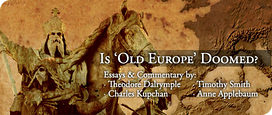I’m sure Dr. Dalyrymple is right about work being the best possible way to integrate foreigners. I can well imagine that much of the tolerance for immigrants that America prides itself on would evaporate pretty rapidly in the case of a severe recession here too.
But I’d like to return to another, not unrelated point, which is one that he started off with: Namely, the fact that much of Europe’s self-perceived “decline” is as much psychological as economic. I lived in Britain during the 1990s, a time when the country was generally improving economically. But the economic growth didn’t stop books about the country’s decline from becoming best-sellers, and didn’t prevent the media from remaining bitter and cynical about the political class.
Partly this is to do with the sense of relative decline that Dr. Dalrymple mentions: Many Europeans are richer this decade than they were in the last decade, but they aren’t richer than everybody else. Nor are they dominating the global economic game. People across the continent resent the fact that you have to speak English, and play by what they imagine to be America’s rules in order to do well. It’s an assault on their national identity.
In that context, the large numbers of immigrants who also don’t seem interested in playing by European rules attract extra resentment: They undermine the (already shaky) national identity even more.

